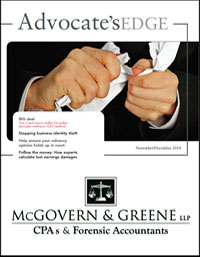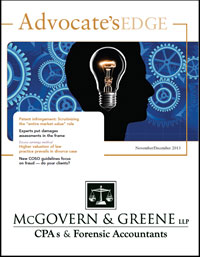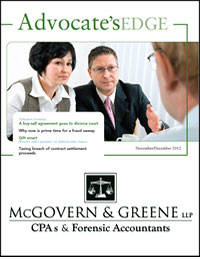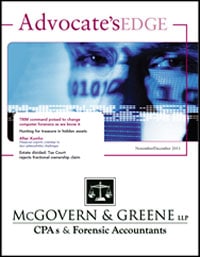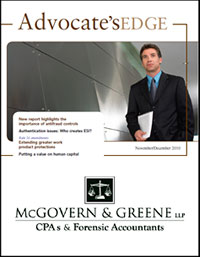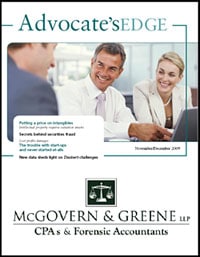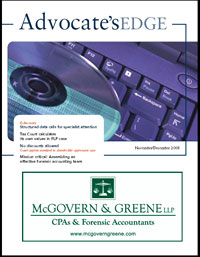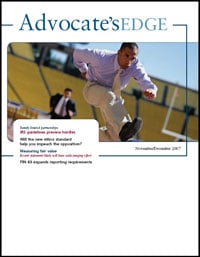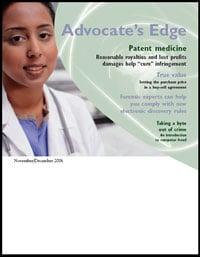Advocate’s Edge
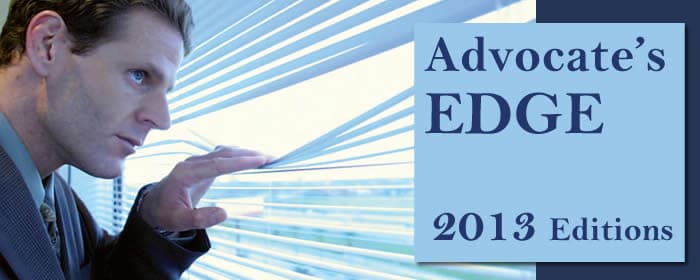
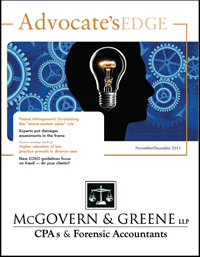 NOV/DEC 2013 Issue of Advocate’s Edge
NOV/DEC 2013 Issue of Advocate’s Edge
Patent infringement: Scrutinizing the “entire market value” rule
Proving damages in patent cases is rarely straightforward, particularly when the infringing item is only a small feature of a larger product. The general rule is that royalties should be based on the “smallest salable patent-practicing unit.” But there’s an exception to this principle — the “entire market value” rule. This article examines one case in which the court decided whether the rule applied. A sidebar discusses four litigation settlement agreements used by the plaintiff’s expert to establish damages.
Experts put damages assessments in the frame
Without a framework for assessing damages, jurors are more likely to make outsize awards that punish the entire company and its stakeholders rather than the offending individuals or company division. But, as this article explains, by breaking a company down, putting profits into perspective and explaining such concepts as net worth and fair market value (FMV), damages experts provide a context for a reasonable award.
Excess earnings method
Higher valuation of law practice prevails in divorce case
In divorce, the value of a spouse’s interest in a professional practice can play a significant role in the final financial outcome. However, such appraisals can result in a range of values. In one recent case, Wright v. Wright, the spouse’s expert used a methodology to arrive at a value three times higher than that of the husband’s expert. This article explains why the court disputed the husband’s contention that this “bottom-up” method didn’t apply.
New COSO guidelines focus on fraud — do your clients?
The Committee of Sponsoring Organizations of the Treadway Commission (COSO) has released the long-awaited revision of its Internal Control — Integrated Framework, updating internal control guidelines that dated back to 1992. This article talks about how the new framework is designed to help organizations apply internal controls more broadly to operations and reporting objectives and to develop a better understanding of how to assess internal controls.
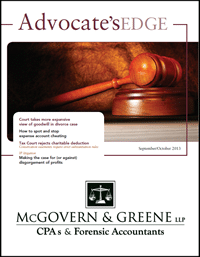 SEP/OCT 2013 Issue of Advocate’s Edge
SEP/OCT 2013 Issue of Advocate’s Edge
Court takes more expansive view of goodwill in divorce case
Goodwill continues to fuel debate in divorce cases involving professionals such as attorneys and physicians. This article examines one case in which the court of appeals reversed a family court’s ruling limiting a law firm partner’s goodwill to the amount he would receive under a stock redemption agreement. The court described other “determinative factors” a court may consider in determining the existence and extent of goodwill. A sidebar addresses the question of whether professional goodwill can be considered community property.
How to spot and stop expense account cheating
The same conditions that make it possible for one employee to cheat may enable others to submit false expense reports. And even small amounts can add up to big losses when several employees and multiple reports are involved. This article explores a few of the more common expense fraud schemes. It also notes control policies and procedures, but emphasizes that enforcement of such controls is key.
Tax Court rejects charitable deduction
Conservation easements require strict substantiation rules
The Internal Revenue Code allows taxpayers to take charitable deductions for qualified conservation contributions. But satisfying the requirements for deductions without solid expert input is difficult, as the taxpayer in one recent case learned. After she donated a façade conservation easement, the IRS challenged the value she claimed as a deduction. This article explains why the appeals court rejected her appraiser’s opinion and accepted the IRS’s position that an easement wouldn’t materially affect the value of her property.
IP litigation
Making the case for (or against) disgorgement of profits
In certain types of intellectual property cases, plaintiffs are entitled to recover — or disgorge — the profits the defendant reaped as a result of the infringement. But determining the proper amount for those profits can prove tricky, especially when it comes to allocating expenses and revenues. This article argues that a financial expert witness must be able to speak authoritatively to both claimed gross revenues and claimed costs and apportionment.
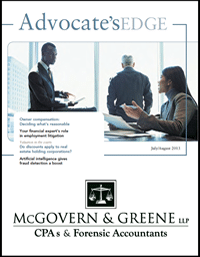 JUL/AUG 2013 Issue of Advocate’s Edge
JUL/AUG 2013 Issue of Advocate’s Edge
Owner compensation: Deciding what’s reasonable
If the IRS deems a shareholder’s compensation unreasonably high for the services rendered, the excessive compensation could be treated as a constructive dividend. So the compensation would be disallowed as a salary deduction. However, as a recent Tax Court decision shows, the “reasonable compensation” evaluation isn’t always as straightforward as it might seem. This article discusses the case, noting the factors that determine reasonable compensation. A sidebar discusses other issues the case addressed.
Artificial intelligence gives fraud detection a boost
This article examines one of the hottest new fraud-detection tools: the use of artificial intelligence to complement investigators’ efforts. It discusses the technology’s flexibility and adaptability, highlighting three types of artificial intelligence that have been used to detect fraud: neural networks, genetic algorithms and fuzzy logic.
Your financial expert’s role in employment litigation
Financial experts play a critical role in wrongful termination cases and other types of employment litigation — particularly in estimating lost earnings. Such calculations tend to be complicated because experts must account for everything from earnings to retirement plan benefits to group insurance rates. This article describes how an expert determines an employee’s base earnings and then factors in benefits and perks.
Valuation in the courts
Do discounts apply to real estate holding corporations?
Discounts for lack of marketability (DLOM) aren’t unusual when a business or real estate is valued. But what about when a business that holds real estate is valued? Can DLOMs be applied to both the real estate and the corporation? Yes, according to one New York court— and that discount should account for built-in gains. This article summarizes the case.
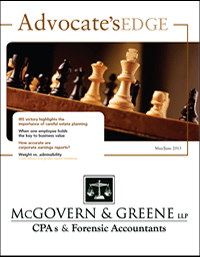 MAY/JUN 2013 Issue of Advocate’s Edge
MAY/JUN 2013 Issue of Advocate’s Edge
IRS victory highlights the importance of careful estate planning
This article discusses a recent case in which the IRS attacked a family limited partnership (FLP) for being an invalid partnership under state law. The IRS lost that argument. Ultimately, however, it was the decedent’s estate planning that undermined the FLP, thus handing the IRS another win in its long-running campaign against FLPs. A sidebar notes that the estate did prevail on whether some cash transfers that the FLP made were loans or gifts for federal gift tax purposes.
When one employee holds the key to business value
A company’s earnings and cash flows can suffer significantly when an executive or other critical employee leaves. To account for this risk, professional valuators may apply a key-person discount. These discounts don’t apply to all business appraisals and they’re rarely one-size-fits-all. This article discusses several questions valuators ask that are specific to the subject company and its key employees.
How accurate are corporate earnings reports?
This article reviews a recent academic research report that provides valuable insight into earnings manipulations. Such manipulations potentially could affect damages calculations and other legal matters. The report explains what constitutes high-quality earnings and notes red flags that can help detect earnings misrepresentations.
Weight vs. admissibility
Court allows lost profits expert testimony
When an opposing party in a lawsuit challenges the admissibility of an expert’s testimony, the matter often comes down to one of two interpretations: whether the court believes the party’s arguments go to the admissibility or to the weight of the evidence. This article examines a federal district court ruling that illustrates such determinations and highlights the need to present relevant expert testimony.
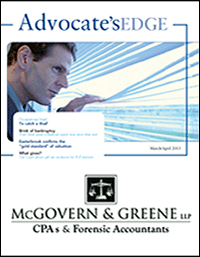 MAR/APR 2013 Issue of Advocate’s Edge
MAR/APR 2013 Issue of Advocate’s Edge
Occupational fraud
To catch a thief
In its 2012 Report to the Nations on Occupational Fraud and Abuse, the Association of Certified Fraud Examiners (ACFE) estimates that the typical organization loses 5% of its revenues to occupational fraud every year. This is just one of many numbers that are alarming, as are some of the ACFE’s other findings — such as those related to fraud perpetrators. This article examines who commits fraud, what motivates them, and how to stop them. A sidebar lists several red flags to watch for.
Brink of bankruptcy
Your client needs a financial expert now more than ever
Business bankruptcies are finally on the decline after several consecutive years of high and rising rates, but that doesn’t mean much to the thousands of companies still in financial peril. This article explains how financial professionals can help assess the severity of a financial crisis, determine whether liquidation or reorganization makes sense, and provide guidance on everything from selling assets to shareholder disputes.
Easterbrook confirms the “gold standard” of valuation
Many legal issues revolve around business valuation, including damages calculations in commercial litigation. In one recent case, Seventh Circuit Court of Appeals Chief Judge Frank Easterbrook turned to what he called the “gold standard of valuation” to help determine damages for plaintiffs who were deprived of their stakes in a business. This article explains what the judge, vacating the district court’s judgment, found wrong with that court’s opinion.
What gives?
Tax Court allows gift tax exclusion for FLP interests
Reversing its own recent trend, the U.S. Tax Court in a recent case held that gifts of interests in a family limited partnership (FLP) qualified for the federal annual gift tax exclusion. In three previous cases, the same court held that the exclusion didn’t apply to gifts of limited partnership interests. This article looks at the court’s reasoning.
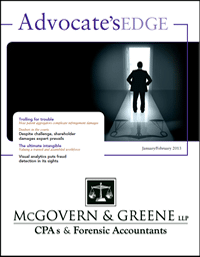 JAN/FEB 2013 Issue of Advocate’s Edge
JAN/FEB 2013 Issue of Advocate’s Edge
Trolling for trouble
How patent aggregators complicate infringement damages
Many experts attribute the jump in patent infringement lawsuits to patent aggregators — also known as “patent trolls.” Patent aggregators differ from traditional patent holders in several important ways, and these differences can affect how patent infringement damages are calculated. This article examines the “reasonable royalties” method that patent aggregators prefer as a remedy for infringement, while a sidebar discusses proposed legislation to protect technology companies from frivolous lawsuits by aggregators.
The ultimate intangible
Valuing a trained and assembled workforce
Intangible assets — including a trained and assembled workforce — increasingly represent a significant piece of many companies’ total value. Companies may need to know the value of their human capital for financial reporting, merger, litigation and workforce reduction purposes. This article talks about how appraisers value an assembled workforce.
Daubert in the courts
Despite challenge, shareholder damages expert prevails
Although the Daubert standard for expert testimony has been around for about 20 years now, many in the legal community don’t seem to understand it very well—at least that’s what a recent district court ruling in a shareholder lawsuit suggests. When the defendant company challenged the qualifications of the shareholder’s valuator on the basis of what they regarded as his deficient legal knowledge and past methodological errors, the Delaware Supreme Court said they were missing the point.This article summarizes the court’s decision.
Visual analytics puts fraud detection in its sights
The amount of data available to sift through for signs of fraud can be overwhelming. Fortunately, the latest data visualization tools can help fraud experts find the proverbial needle in the ever-growing haystack of potential evidence. Visual analytics has been employed by fraud experts to detect everything from money laundering and bribery schemes to financial statement, purchasing, insurance and e-commerce fraud. This article explains how experts uncover such schemes by using specialized software.
This publication is distributed with the understanding that the author, publisher and distributor are not rendering legal, accounting or other professional advice or opinions on specific facts or matters, and, accordingly, assume no liability whatsoever in connection with its use.
GFAS Advocate's Edge Archives
Expert Forensic Accounting Services
Chicago | Las Vegas
FORENSIC ACCOUNTING
SERVICES
Insurance Claims
Accounting Investigations
Mergers & Acquisitions
Due Diligence Reviews
Dispute Advisory Services
Special Examinations
Contract Audits and Recoveries
LITIGATION SERVICES
Expert Witness Testimony
Commercial Damages
Shareholder/Partner Disputes
Bankruptcy and Insolvency
CPA Malpractice Claims
Contract Disputes
Estate and Trust Disputes
Data Mining & Electronic Discovery
FRAUD EXAMINATIONS

